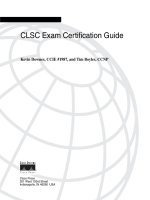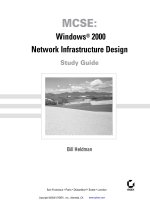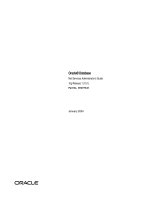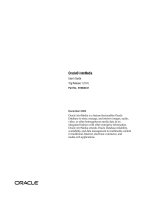Sustainable events guide ppt
Bạn đang xem bản rút gọn của tài liệu. Xem và tải ngay bản đầy đủ của tài liệu tại đây (311.12 KB, 10 trang )
think sustainable
t
Sustainable events guide
e
Department for Environment, Food and Rural Affairs
Nobel House
17 Smith Square
London SW1P 3JR
Telephone 020 7238 6000
Website: www.defra.gov.uk
© Cr
own copyright 2007
Copyright in the typographical arrangement and design rests with the Crown.
This publication (excluding the royal arms and departmental logos) may be re-used free of charge in any
format or medium provided that it is re-used accurately and not used in a misleading context. The material
must be acknowledged as cr
own copyright and the title of
the publication specified.
Published by the Department for Environment, Food and Rural Affairs
Product code PB12800
1
think sustainable
t
Sustainable events guide
Before organising your event, it is worth checking to see if there are other ways you can fulfil
your objectives. You might be able to share ideas or engage with stakeholders and customers
through another means e.g. video or teleconferencing.
Organising an event? Here’s our guide to help you:
Think about your social, economic and environmental impacts from the start – reducing
these impacts should be integral to any event
•
Include sustainability clauses in
contracts
•
Use the 3 Rs – reduce, reuse, recycle
•
Communicate electronically rather
than by paper
•
Be energy and water efficient
•
Minimise the impacts of travel
•
Think about the wellbeing of your delegates, the local community, your suppliers and any
other stakeholders
•
Raise awareness of your efforts and share best practice
What’s included?
Options for organising events, split into the following themes:
Who’s it for?
This guide is intended to help governmental organisations plan successful and sustainable
events. To protect our natural resources and save money, it is important that all aspects are
not only sustainable but also seen to be sustainable, from the choice of venue (for example,
is it easily accessible by public transport?) to the delegate pack and any giveaways (are you
using recycled stationery and avoiding plastic bags which are usually not biodegradable and
have a negative image?), and the catering & food miles, and tap rather than bottled water.
Can I use this guide if an external provider is organising my event?
Whilst larger events are likely to be or
ganised by external providers, the principles in this
guide still apply and should be factored in to any contract with external providers. In fact, for
major events there may be scrutiny by the media and Non-Government Organisations (NGOs)
about whether government is living up to its own sustainability principles.
Share this guide with your supplier, discuss options and then include appropriate clauses in
your contract.
1
Government procurement r
ules, including obtaining value for money, may
also be relevant so take a look at the referenced documents. A British Standard (BS 8901) on
sustainable event management is due to be published in autumn 2007 (-
global.com/BS8901). This should provide a comprehensive sustainability guide for all events:
BS 8901 can guide the issues to be included in contract clauses.
Transport Venue
Catering
Preparation
Social Wellbeing
Raising
Awareness
Evaluation
1
For more information on engaging in contracts with suppliers, see
/>2
think sustainable
Sustainable events guide
think sustainable
Will I get value for money?
Use these options from the very beginning and you could save money: cost-saving, sustainable
options such as serving tap water instead of bottled water balances out more expensive choices
like ordering sustainably-sourced fish; using electronic communication will save on paper,
energy use and postage. Thinking sustainably will also help you achieve value for money, by
taking into account total production costs and quality. See the boxes below for tips and ideas.
Remember that it may not be possible to do everything suggested in the guide, so think about
the overall approach and how the options you choose can make your event more sustainable.
Why measure?
Your event could have a substantial impact on the environment. Keeping a record of
activities undertaken (e.g. energy/ water used and waste produced) does not have to be
an onerous exercise! It will enable effective evaluation and will allow delegates and other
stakeholders to have confidence in your efforts. Measurements allow continuous
improvement – by helping you to a) minimise your negative sustainability impacts over time
and b) become more ambitious with each event.
Transport
Reduce need for travel:
•
Consider whether video or teleconferencing is a viable alternative
•
If not, consider where delegates are travelling from and
choose a location which minimises the requirement for travel,
particularly by plane/car
•
Recommend accommodation within walking distance of
event venue or use a venue which also offers accommodation
Reduce the impacts of travel by offering a travel plan:
•
Try to find venues close to public transport and promote the available public transport
links to delegates. Provide a link to a travel site such as the DfT’s Transport Direct
o/
•
Provide a link to a map such as www.streetmap.co.uk (or, if in London,
and tell delegates how they can reach the venue on foot
•
Promote and/or provide cycling facilities, such as local cycle lanes & routes and bike racks
•
If venue is not in walking distance of public transport, of
fer a shuttle service or encourage
taxi-sharing
•
Limit the number of car parking spaces available, and provide them only to those who are
unable to travel by public transport
•
For those travelling by car, encourage car-sharing: put delegates in touch with others
travelling from the same areas so they can shar
e cars. This networking opportunity can
also add value to delegates
•
Offset staff and delegate carbon emissions or encourage delegates to offset their own
emissions – a British Standard on carbon offsetting is due to be published in autumn 2007
Top tip: Use low emission vehicles such as hybrid cars if possible.
Reducing travel not
only reduces carbon
emissions, it also saves
on costs and improves
the wellbeing of your
delegates
3
think sustainable
t
Sustainable events guide
Venue
Choice of venue:
2
•
Try to use venues that have sustainable or environmental
policies of their own because they will be more keen to
cooperate. A simple indication of an organisation’s
environmental commitment is if they have an environmental
management system certified to a national or international
standard, such as ISO 14001, BS 8901 “Sustainable event
management system – specification with guidance for use”
(both on www.bsi-global.com), BS 8555 (www.iema.net/acorn)
or if they are registered with the Eco-Management & Audit
Scheme (EMAS) (www.emas.org.uk)
•
Ask hotels if they are registered with the Green Tourism
Business Scheme which provides a comprehensive green audit
of accommodation facilities, or if they have won any
Sustainable Business Awards
You may not be able to include all sustainability requirements in the contract, however, once
agreed, work with suppliers to encourage more environmentally friendly measures. Use this
guide to raise awareness of sustainability issues for your event and you may even influence the
venue itself.
•
Top questions to find out if a venue is sustainable:
– Do you have members of staff with responsibility for environmental management
and Corporate Social Responsibility?
– Do you buy products with a reduced environmental impact e.g. energy-saving
lightbulbs, energy efficient electrical equipment, recycled paper, low VOC paints,
natural cleaning products etc?
– Do you practice waste minimisation and have recycling facilities?
– Have you installed water-efficient devices for taps and toilets and water saving
devices for showerheads?
– Have you implemented water conservation measures such as rain water harvesting or
grey-water reuse?
– Do you buy green electricity or generate your own renewable energy?
– Have you installed motion sensors for corridor lighting and r
eminders to turn lights
off when leaving rooms?
– In hotels, are bed linen and towels only changed if guests leave a card requesting so
and are toiletries provided via dispenser, not individually packaged?
– Do you prepare fairly traded, and/or fresh produce in season? (
See catering)
There may be a
suitable venue for
your event in your
own organisation or
elsewhere in the
public sector so check
this option first as it
could save money
2
For more detailed advice on sustainable purchasing, see the Defra and Office of Government Commerce (OGC)
“Environmental Issues in Purchasing” guide and the OGC “Social Issues in Purchasing” guide.
4
think sustainable
Sustainable events guide
•
Larger venues often require more heating and cooling so try to use venues of appropriate
size for the number of attendees and minimise space taken up by exhibits. Using a venue
with natural ventilation will not only save energy, it will also keep your delegates alert
•
Use a venue which provides in-house equipment (audio-visual etc) so reducing the need
for transportation
•
Choose a venue which maximises natural lighting so reducing the need for electric lighting
Although many venues may not yet have sustainability measures in place, it’s worth asking
these questions and to show that there is demand and to encourage them to change their
practices.
Getting the most out of the venue:
•
Make sure all electrical equipment and power supplies are
turned off when not in use, encourage delegates to use the
stairs instead of the lifts
•
Use heating and air conditioning sparingly – heating above
21 degrees is not required and use natural ventilation
where possible rather than air conditioning
•
Arrange stands/displays etc to maximise use of natural light
•
Provide clearly labelled recycling bins for different types of waste and advertise their
presence
Contracts:
You have the power to affect an entire supply chain! Contracts and tender specifications
are a vital tool in improving the sustainability of your event(s). Work with your suppliers to
set specific and ambitious targets against which progress can be measured. Include clauses
in contracts requiring suppliers to comply to your sustainability policy, such as:
•
The supplier will use energy and water as efficiently as possible
•
The supplier will comply with the event organiser’s waste management requirements,
including a recycling policy
•
The supplier will comply with the event organiser’s sustainable catering requirements
•
The supplier will measure their impacts relating to the event, e.g. food miles, energy
use, waste produced and recycled, water used
– this does not have to be detailed!
Turning your
thermostat down one
degree saves up to
10% on the electricity
bill: save energy to
save money!
5
think sustainable
t
Sustainable events guide
Catering
For smaller events, you will often be limited to using in-house catering, but it’s still worth
asking the questions below to find out about their policies and see if you can encourage
them to make changes
Getting the most out of your caterer:
•
Ask your caterer as far as possible to serve:
– Fresh produce in season as this will generally mean less energy has been used in its
production.
– Consider produce meeting farm assurance standards, such as Red Tractor, LEAF Marque
or equivalent
4
.
– Fish from sustainably managed sources that are harvested in a manner that does not
lead to over-fishing or depletion of exploited populations.
– Fairly traded products, such as coffee, tea, bananas and chocolate
5
.
– A good range of vegetarian choices and options suited to specific dietary requirements,
including choices for ethnic minorities.
– Fr
esh fruit as an alternative to prepared desserts.
Top tip: Have attendees sign up for meals in advance to reduce wastage and ask
which sessions they plan to attend e.g. morning, afternoon or both.
•
Top questions to ask your caterer
3
:
– Do you use mostly fresh, seasonal produce?
– Are fairly traded goods such as coffee and tea available?
– Do you serve meals produced from healthy and nutritious ingredients and avoid
foods that are high in fat, salt and sugar?
– Do you serve food in bulk rather than individually packaged?
– Do you offer tap water to drink to save on transportation of bottled water and
recycling of bottles? If bottled water is unavoidable, buy water in biodegradable
corn-based bottles or, as a last resort, ensure the bottles are recycled.
– Do you operate a recycling scheme, including composting? On-site is best.
– Do you use reusable crockery, glassware, cutlery, tablecloths etc where possible?
If disposables are unavoidable, use paper or wooden recyclables, or biodegradable
plastics.
3
For further information on food procurement, including fair-trade, health and nutrition, consult the Public Sector Food
Pr
ocurement Initiative (PSFPI): />4
“Equivalence” is explained in Defra’s catering toolkit – see the model clause on farm assurance at
/>5
There are legal r
equir
ements gover
ning how products, such as food, can be specified and purchased in the EU. For
example, it is possible to specify “organic” as this is a method of production that affects the quality of the product being
supplied. You may not specify “FairTrade” or fairly traded goods but advertisements and invitations to tender can make it
clear that fair trade options can be included in the pr
oducts provided. OGC has published “Guidance on Fair and Ethical
Trading” giving advice on the issue, see: />6
think sustainable
Sustainable events guide
think sustainable
Preparation
Communication:
•
Avoid excessive paper usage by carrying out all marketing,
correspondence and registration electronically
•
Use double sided printing and non-glossy, recycled paper,
with vegetable based inks where possible
•
Print documents in black and white rather than colour.
•
Make sure plastic name badges are returned at the end
of the event to be reused
Literature:
•
If providing delegate packs, hand them out on arrival to
avoid duplication
•
Format handouts to minimise amount of paper required e.g.
reduce the margins in page setup, print double-sided and print
more than one page per sheet (this particularly applies to
PowerPoint handouts)
•
Provide links to downloads of literature rather than providing
large handouts, or offer documents on CDs or memory sticks
•
Have a laptop and printer on site so that literatur
e can be
printed out on demand if delegates require hard copies.
And ensure that all paper waste is collected and recycled
Materials:
•
Use whiteboards rather than paper flipcharts
•
Use reusable, rather than event-specific, name badges, signs
and display materials and collect these items after the event
•
Use reusable materials for exhibition stands, flooring etc. Hire rather than purchase items –
this should be a contractual requirement
•
Use pens and pencils made from recycled/sustainable materials (e.g. from recycled vending
cups or timber from sustainably managed forests). These make a positive statement about
the efforts you are making to reduce the impact of your event, and also can be used to
communicate important messages
•
If reusable materials are not appropriate, use recycled and/or recyclable materials for
packaging, paper etc – this should be a contractual requirement
•
Communicate in advance with the venue to inform them of likely waste materials – a later
event may be able to make use of them
•
If bags are needed, use reusable organic cotton, jute or recycled bags rather than plastic,
and advertise the benefits on the bags
Ask exhibitors and/or event management companies to comply with these suggestions and
reuse or recycle leftover literature.
Top tip: To enable signage to be reused – avoid putting the date on.
Electronic
communications save
on the costs of paper,
printing and postage
Use large paper clips
to hold the contents
together instead of
expensive and
wasteful individual
folders
Reusable display
materials etc save on
costs of producing
new ones for
different events
7
think sustainable
t
Sustainable events guide
Social wellbeing
It is unlikely that every need can be anticipated. However, venues chosen need to have basic
reasonable adjustments on behalf of individuals.
•
Basic standard requirements will include access to buildings such as; level or ramped entry,
acoustics appropriate for hearing aid users and (working) loop systems in lecture theatres
or reception desks
•
Ensure you communicate emergency evacuation arrangements such as;
– flashing light fire alarms or vibrating pagers for deaf people
– fire refuges or alternative escape routes for people with mobility impairments
– the accessibility of external paths and landscaping
– accessible toilets, convenient and reserved parking spaces for those who need them.
This should include any related website/electronic communications.
•
There are legal requirements for employment (equal opportunities and pay) and health
and safety: if you become aware of breaches of these, intervene
•
Identify and engage with stakeholders e.g. local community and communicate information
about the event and the sustainability measures being undertaken
•
Communicate local attractions and amenities to your delegates to benefit the local
economy and educate delegates
Raising awareness
•
Make delegates aware of the sustainability measures being taken to improve the image
and reputation of the organisation and to protect the environment. For example, make an
announcement at the welcome session with information about the seasonality of the
produce on offer and the benefits this delivers (e.g. benefits of local or international
options). This information should also appear on any electronic communication.
Evaluation
•
Evaluate the success of the measures taken and learn for next time. In addition to your
evaluation, offer delegates the opportunity to provide feedback e.g. electr
onically or on a
recycled paper form – preferably before they leave
•
Email delegates and other stakeholders to inform them of the successes, and areas for
improvement, such as energy savings and % waste recycled. Transparency is a key
principle of sustainability. No-one expects you to be perfect, but they expect you to try
•
Use carbon calculators to calculate the emissions generated by the event. As a last
resort, these can be offset. For government event offsetting, contact
Top tip: Improving the wellbeing of your delegates, for example by minimising travel,
providing plenty of fr
uit and water and maximising natural daylight, will help them
to stay engaged and productive.
Published by the Department for Environment, Food and Rural Affairs.
© Crown Copyright 2007.
Printed on material that contains a minimum of 100% r
ecycled fibr
e
for uncoated paper and 75% recycled fibre for coated paper.
www.defra.gov.uk
PB12800
Further information
For a simple checklist to aid discussions with your venue, see the GOSW-SDC-Envirowise
“Greener Events” guide at
British Standards institution will be publishing BS 8901, ‘Sustainable Event Management
System – Specification with Guidance for Use’ in autumn 2007:
www.bsi-global.com
Envirowise offer advice on waste minimisation, resource efficiency, environmental policy
writing and much more at
www.envirowise.gov.uk/ and helpline 0800 585794.
WRAP offer advice on waste minimisation and recycling at
www.wrap.org.uk
The Energy Saving Trust offer advice on energy efficiency, especially for buildings and
transport, at
www.est.org.uk
The Carbon Trust offers advice on how businesses and the public sector can reduce carbon
emissions at
www.carbontrust.co.uk
Defra page on carbon off-setting:
Greenhouse gases produced as a result of preparation; travel to/from and attendance on a
conference can be calculated by visiting
www.climatecare.co.uk or www.futureforests.com
For more information on engaging in contracts with suppliers, see
For more detailed advice on sustainable purchasing, see the Defra and office of Government
Commerce (OGC) “Environmental Issues in Purchasing”:
/>and for “Social Issues in Purchasing”:
/>For more information on food procurement, including fair trade, health and nutrition, consult
the Public Sector Food Procurement Initiative (PSFPI):
For the model clause on farm assurance see
For guidance on Fair and Ethical Trading see:
For information on a list of hotels which have been assessed for their environmental
standards see
www.green-business.co.uk and www.greenstop.net









